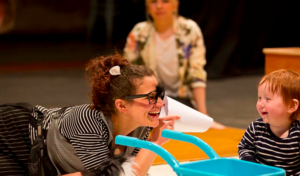Learning to Let our Children Explore
I’ve already mentioned in my posts how this festival is creating a nurturing environment for children and their caregivers. Today I’ve seen how this sort of space not only makes for a pleasant day, but also sets up a positive environment in which parents feel comfortable giving their kids some freedom to roam. And in a world of “helicopter parents” this sort of reminder can be refreshing.
This morning I watched Hup, a piece from Scotland’s Starcatchers geared at very young children. (I would say the average age in the room was 9 months.) It was a cozy forest fantasyland built on the Theatre Centre mainstage, filled with mischievous raccoons, friendly violinists and cellists, pillows, wheelbarrows and lots of room to play.
As the music swelled and the babies gazed with wonder, many a parent had a tear in their eye to share such an emotional moment with their child. As we sat around on the floor – at baby level – listening to the cello, watching the awestruck babies, I felt so calm. And I saw these other new parents, likely exhausted from 3am feedings and diaper changes, lounging on a plush carpet, under the soft warm glow of lights, listening to beautiful music with their families. I could feel a collective sigh of relief. I could also feel a collective realization from the parents: “Oh wait, I’m actually enjoying this too. I thought it was just for her/him. But this moment is actually for me.”
I spoke with Rhona Matheson, of Starcatchers, after the show. She said that one thing she loves about the work is that “the parent and the child share in this together. And they both have that lovely spine-tingling experience.”
As we lounged in this fashion, like 20-somethings on the grass at Trinity-Bellwoods park, I realized that parents felt safe, and they trusted the performers enough to know that their kids were safe. The rules were set out very clearly at the beginning of the show by a performer, so everyone knew where kids could crawl (pretty much everywhere) and what they could touch (almost everything). The company even had what I would call a “baby wrangler” on the periphery of the action, just in case an older toddler got into something they shouldn’t. And this company member was also there to encourage parents to relax. I’m pretty sure at one point she leaned into a hovering parent and said something like: “Don’t worry, you can let him walk over there.”
I spoke to Rhona about this instinct that many new parents have to “hover” or “helicopter” over their kids and babies. She replied, “There’s a fear that the kids are going to hurt themselves. You see it in the show when the kids are moving around. It’s hard for the parents to be able to let them go. But kids need to have that little bit of space.”
She mentioned a performance for babies she saw in Australia a few years ago. At one point in the show the adults were asked to stand on one side of a small cardboard fence, with the babies in the middle. She said this was very hard for the parents. Maybe they were afraid that their baby would get hurt or hurt another baby. “But,” said Rhona, “what you got was a community of babies who were all just playing together. And connecting. And they were all under 12 months. The parents were only on the other side of the cardboard for a minute, or two minutes. But you could sense this tension. And I found that really fascinating.” I personally have felt that tension as a parent, whether at the playground or the library. It’s hard to let go and allow your baby to interact with another. It’s hard to know what the rules are.
Throughout this festival I’ve seen moments where artists have helped parents and caregivers to relax about these rules – in moderation, of course. I remember at the end of Woodbeat, the performer opened a pathway for a few children to enter the stage. The performer made eye contact with a few kids, pointed at the path and simply said, “For you.” The children tentatively began to move towards the path, but, instinctively, the teachers started to intervene and plan out the approach. The performer gently asked the teachers if they could let the kids sort it out. The teachers nodded. And the kids did sort it out. They took their turns; they treated the set with respect. It was an interesting moment. (No disrespect to kindergarten teachers, of course. They were working within a specific mode, and the performer was simply suggesting another mode.)
Rhona and I ended our discussion on this topic. We were talking about that fine line between protecting kids and letting them explore. “Yes you want to make sure they’re safe,” she said, “but they also need to be able to experience the world. And a problem at the moment is that kids are so overprotected that we’re in grave danger of creating a generation of adults who lack resilience and are not prepared to take risks.”
For babies, allowing them to “experience the world” might be as simple as letting them crawl up to a strange baby and touch them. Or crawl just a few inches further away from you. But slowly we learn to trust them, and they learn how to make the right decisions. It might take about 18 years for this process to complete, but I can’t think of a better place to start the journey than within the nurturing walls of the WeeFestival.
Only a few days left, folks! Check out the exciting Holiday Monday schedule here.

Promotional image from Hup
